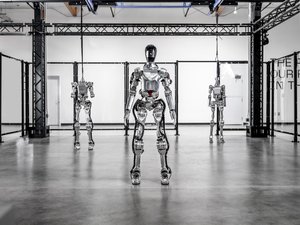
In a bustling metropolis, Sarah steps into her office building, greeted not by a receptionist but by an AI-powered virtual assistant. As she settles into her workspace, her computer screen lights up with personalized suggestions for tackling her day's tasks, courtesy of an intelligent algorithm that learns her work habits over time.
Throughout the day, AI algorithms analyze her interactions, providing real-time feedback on her communication style and helping her refine her approach in meetings and emails. By the time Sarah leaves the office, she feels productive and empowered, knowing that AI has seamlessly integrated into her work life to enhance her performance and satisfaction.
This scenario might sound like a scene from a futuristic movie, but it's increasingly becoming a reality in workplaces. The role of artificial intelligence (AI) in the employee experience is rapidly evolving, reshaping how we work, collaborate and grow professionally.

From recruitment and onboarding to performance management and career development, AI is revolutionizing every aspect of the employee journey, driving greater efficiency, effectiveness and engagement.
According to a report by Gartner Inc., by 2025, 50% of enterprises will be spending more on bots and chatbots than traditional mobile app development, reshaping the workforce composition and driving unprecedented innovation in employee experience.
Driven by the seismic shift and the immense potential of AI to augment human capabilities, organizations are streamlining workflows and unlocking new opportunities for collaboration and creativity.
One of the most impactful areas where AI is transforming the employee experience is talent acquisition. Traditional recruitment processes often include biases and inefficiencies, leading to suboptimal hiring decisions.
However, AI-powered tools can analyze vast amounts of data to identify top candidates based on skills, experience and cultural fit, helping companies build more diverse and high-performing teams.
A study by LinkedIn found that 76% of talent professionals say AI's impact on recruiting will be significant in the next five years. By leveraging AI to automate routine tasks such as resume screening and candidate outreach, HR professionals can focus their time and energy on building relationships and providing a more personalized experience for candidates.
Once onboarded, employees benefit from AI-driven personalization and support throughout their journey within the organization. Intelligent systems can deliver personalized learning and development opportunities tailored to each employee's role, skills and career aspirations.
Analyzing performance data and feedback in real-time, AI algorithms can provide timely coaching and support, helping employees continuously improve and grow in their roles. As a result, employees can feel more engaged, motivated and invested in their professional development, leading to higher retention rates and increased organizational success.
Moreover, AI is revolutionizing the way organizations measure and manage employee performance. Traditional performance reviews are often subjective, infrequent and disconnected from day-to-day activities. However, AI-powered tools enable continuous feedback and evaluation, allowing managers to track progress, identify strengths and areas for improvement and provide actionable insights in real-time.
According to a survey by Deloitte, 83% of organizations assert that they must redesign their approach to performance management. By harnessing the power of AI, companies can create a culture of transparency, accountability and continuous improvement to drive higher levels of employee engagement and productivity.
However, despite the tremendous potential of AI to enhance the employee experience, it is critical to address the issues of privacy, ethics and equity. As AI systems become more pervasive in the workplace, it's crucial to ensure they are designed and implemented responsibly, with safeguards to protect employee data and corporate IP and mitigate algorithmic biases. Organizations must prioritize transparency and accountability in their AI initiatives, developing employee trust and confidence.
In conclusion, AI has the potential to revolutionize the employee experience, empowering individuals to achieve their full potential and driving enhanced organizational success. Companies that employ AI to accelerate recruitment, customize learning and development, and boost performance management may build a more flexible, resilient and innovative workforce.
However, realizing the full benefits of AI requires a thoughtful and ethical approach grounded in principles of fairness, transparency and accountability.
As we embrace the transformative power of AI, let us strive to build a future where technology enriches the human experience and empowers individuals to thrive in the workplace and beyond.
— Don Weobong, MBA, is president and CEO of Louisville-based eLeaP, which helps clients in highly regulated industries such as pharmaceuticals, biotechnology, medical devices and manufacturing meet federal and international regulations and build strong teams. He is also the board president of COPES Inc., a Louisville-based nonprofit organization that helps build resilient families. Reach him at don@eleapsoftware.com









